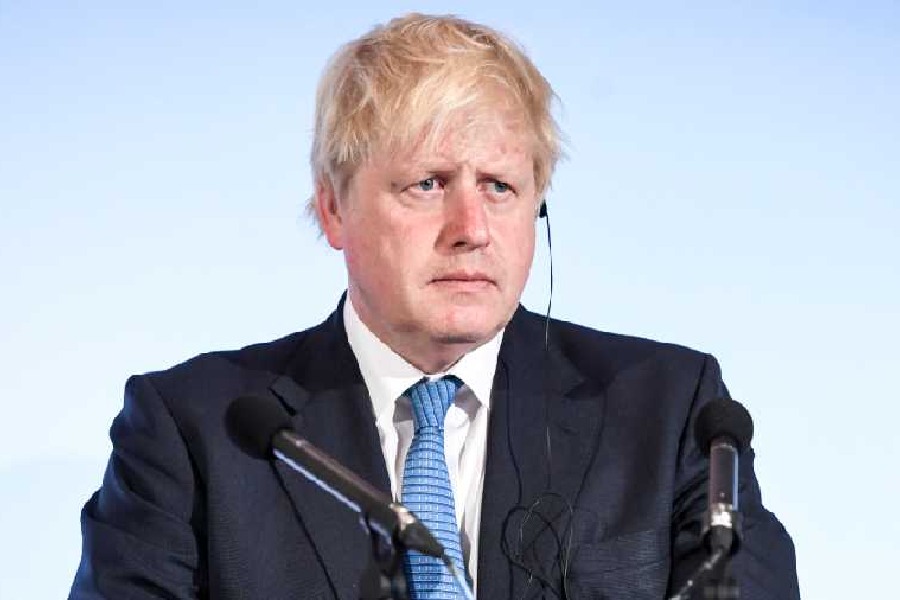This is the question people in Britain are asking after the powerful privileges committee of the House of Commons found the former prime minister guilty of the gravest sin for a politician — that he deliberately “misled Parliament”.
This may seem a little arcane to foreigners but in British politics, this is a resigning matter. The best example is that of John Profumo, the upper-class secretary of war in Harold Macmillan’s Tory cabinet 60 years ago.
On March 22, 1963, he told the Commons there had been nothing improper in his relationship with Christine Keeler, a ravishingly beautiful but working-class girl of 19.
On June 6, 1963, he resigned after admitting to the Commons: “I misled you, and my colleagues, and the house … I did this to protect, as I thought, my wife and family, who were equally misled, as were my professional advisers. I have come to realise that, by this deception, I have been guilty of a grave misdemeanour …”
This became Britain’s most celebrated sex scandal. Profumo’s mistake was not that he had slept with Keeler – he would probably have been forgiven had he said, “Listen chaps, I got a bit carried away, you know how it is” – but that he had told fellow MPs that he hadn’t. This was unforgivable in a gentleman. That sets Boris’s behaviour into context.
The privileges committee found in its 30,000-page report published on Thursday that he had deliberately “misled” Parliament over what happened during Partygate when the UK was in lockdown ordered by Boris himself as Prime Minister.
Had Boris not resigned as MP for the west London constituency of Uxbridge and South Ruislip, where his majority is “only” 7,210, the committee would have banned him from the Commons for 90 days, thereby triggering a byelection (which he probably would have lost).
Two members of the committee wanted Boris kicked out of the Commons permanently but others thought this was going too far. As it is the committee wants Boris to be stripped of his security pass and banned from the Palace of Westminster for 90 days so that he cannot come in for lunch, for example, with his supporters.
In its report, the committee said Boris committed “repeated contempt of Parliament, and further contempts in undermining the democratic processes of the Commons”. The sanctions recommended in the report will have to be voted on by MPs on Monday. Boris, whose main mission in life is to bring down Rishi Sunak, will be relying on support from the constituencies.
Harry Cole, the political editor of the Sun, said he had spoken to a “senior Tory” who believed colleagues who voted for the report risked being deselected. The motion will be “voteable, it will be amendable and it is House business and so I am expecting a free vote”, Penny Mordaunt, leader of the Commons, said.
She added: “These are difficult matters for the House, we have to look at the evidence, we have to look at the report. But we’re talking about people who are friends and colleagues, it will be a painful process and a sad process for all of us, the task that we face on Monday. But all of us must do what we think is right and others must leave us alone to do so.”
In his 1,700-word response, Boris raged: “The committee now says that I deliberately misled the House, and at the moment I spoke I was consciously concealing from the House my knowledge of illicit events. “This is rubbish. It is a lie. In order to reach this deranged conclusion, the committee is obliged to say a series of things that are patently absurd, or contradicted by the facts.
“I didn’t think for one minute that a committee of MPs could find against me on the facts, and I didn’t see how any reasonable person could fail to understand what had happened.”
He dismissed the committee as a “kangaroo court” whose purpose “has been to find me guilty, regardless of the facts”. He has admitted his statements misled parliament but denied doing so intentionally or recklessly.
Deputy Labour leader Angela Raynor, who describes Boris Johnson as a “pound-shop Trump” over his response to the report, summed up the views of Boris critics: “Boris Johnson is not only a lawbreaker but he’s a liar.”
According to the BBC’s political editor, Chris Mason, the committee’s findings “are a brutal demolition” of Boris’s defence. He commented: “Remember, today isn’t about parties during Covid. It is about the fundamental pillars upon which public life – and society at large — is constructed. Conduct. Behaviour. Believability. Integrity. The sanctity of truth. The contempt for lies.
“Some will wonder if this report — as punishingly brutal as it is — may motivate a martyrdom, may rally support. One minister said to me, ‘Boris is the sort of bloke who could fall down a manhole head first and still land on his feet.’ But this is one heck of a manhole."
His colleague, Nick Eardley, the BBC’s chief political correspondent, pointed out that Boris “is a politician who has often defied political gravity. He has got away with things in the past which would have ended the careers of others. But can he ever return to front-line politics after these conclusions? It’s hard to see how a politician found to have deliberately misled parliament can recover.”











